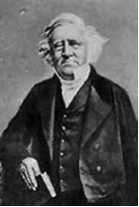 Thomas Love Peacock was an English poet and novelist whose work was mostly of a satirical nature. During his younger years he preferred to spend much of his time out of doors, basically communing with nature. For example, at the age of 21, he took a whole year out from his job in the financial district of London to explore Scotland on foot. He made other expeditions later, including a tour of Wales and the ascent of the great mountain Cader Idris. However, when he was at his writing desk he was greatly influenced by the writer Shelley, a lifelong friend. There came a point in Peacock’s life where his friends were more or less writing him off as a dreamer, maybe even a serial idler. But suddenly he was summoned to London to take up significant employment with the influential East India Company. He remained in this employment for many years and found the environment much to his liking, and it was also a very lucrative engagement as well.
Thomas Love Peacock was an English poet and novelist whose work was mostly of a satirical nature. During his younger years he preferred to spend much of his time out of doors, basically communing with nature. For example, at the age of 21, he took a whole year out from his job in the financial district of London to explore Scotland on foot. He made other expeditions later, including a tour of Wales and the ascent of the great mountain Cader Idris. However, when he was at his writing desk he was greatly influenced by the writer Shelley, a lifelong friend. There came a point in Peacock’s life where his friends were more or less writing him off as a dreamer, maybe even a serial idler. But suddenly he was summoned to London to take up significant employment with the influential East India Company. He remained in this employment for many years and found the environment much to his liking, and it was also a very lucrative engagement as well.
He was born Thomas Peacock on the 18th October 1785 in the south coastal town of Weymouth, in the county of Dorset. He took his mother’s maiden name (Love) as his own middle name. Following the death of his father in 1794 the family were not at all well off and were living with Mrs Peacock’s family in the pretty Thames-side town of Chertsey, just to the south west of London. He was at school in Chertsey for a short while before being withdrawn at short notice in favour of a home education. Thomas had written a couple of poems by the age of 13 but his literary career was interrupted by the need to earn a living and he was set to work, aged 15, with a merchant company in the City of London.
He maintained links with other young writers though, including Leigh Hunt, and contributed to a periodical called The Juvenile Library. Thomas had a voracious appetite for reading and sat for hours in the British Library studying classic Greek and Latin literature. By 1806 he had published his first two volumes of poetry: The Monks of St. Mark and Palmyra. It was at this point though that he grew bored of his clerical job in the City and set off for his walking tour of Scotland.
On his return he joined the Royal Naval ship HMS Venerable as assistant to the Captain. He thought he would enjoy life on board but things did not work out well, hence this quote:

He was soon back ashore, at Chertsey, penning an ode to the River Thames called The Genius of the Thames. Another trip, this time to Wales followed and then he met Shelley for the first time, in 1812. This was a deep and lasting friendship and the two exchanged ideas about writing whenever they met. Perhaps he was influenced by Shelley when he produced the satirical Sir Proteus in 1814. He followed this with two other titles in the same vein: Melincourt (1817) and Nightmare Abbey (1818).
But then came his opportunity to finally become solvent when the East India Company took him on as a researcher into Indian affairs. He said much later that it was employment of:

By 1823 Peacock was earning enough to buy a smart residence in Lower Halliford, to the west of London. His writing output slowed up as his work commitments increased but he did continue to write on and off for the rest of his life. In fact one of his odes was about office life itself with his unmistakable satirical style throughout. Here is A Day at the India Office:

Peacock retired in 1856 and spent the rest of his days comfortably off, enjoying his books, his garden and the River Thames. Tragically he was killed in a fire at his home while trying to salvage his beloved library.
Thomas Love Peacock died on the 23rd January 1866, aged 80.

